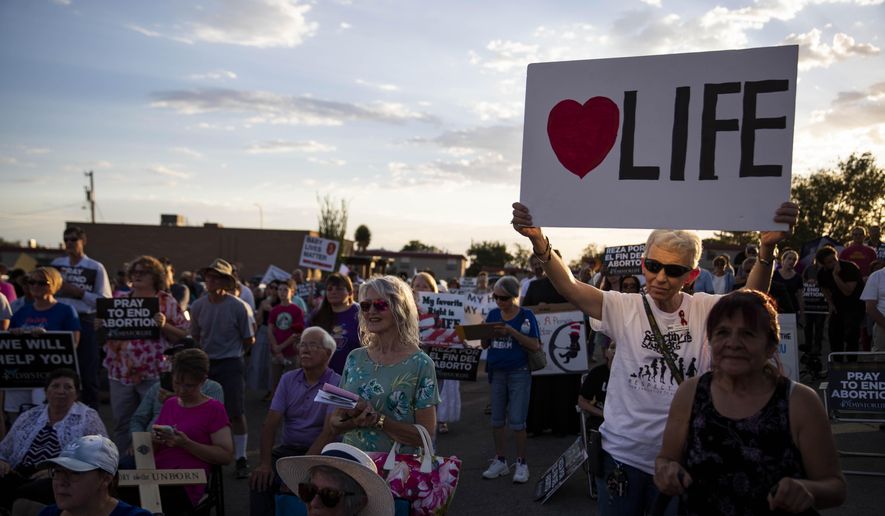Pro-life demonstrations are planned in Michigan and Texas Saturday as activists, emboldened by the end of Roe v. Wade, push state lawmakers to go even further and ban abortions from conception.
Activists have scheduled at least nine statehouse marches this year as they push for stronger abortion restrictions since the Supreme Court in June overturned Roe and kicked the issue back to the states.
Marches are planned for Arizona, Maryland and Virginia next month; California and Connecticut in March; Pennsylvania in September; and Ohio in October.
“The goal of pro-life efforts in the states is the same as it was at the federal level: to finally and fully ensure the right to life of all persons,” Caroline Cyr, program officer at the Clare Boothe Luce Center for Conservative Women, said in an email. “This is a goal as old as the Declaration of Independence and, some argue, as old as life itself.”
In abortion-restricting Texas, activists hope to dissuade women from ordering pills or traveling out of state to terminate pregnancies, said Karen Garnett of Heroic Media, a Dallas pro-life marketing firm.
“Our country is now a checkerboard with nearly half of the states restricting abortion and the other half not restricting abortion,” Ms. Garnett said in an email. “While statistics indicate the number of abortions decreasing in states where abortion is restricted, we also see the reality of many women crossing state lines to procure an abortion.”
Republican Gov. Greg Abbott is scheduled to address activists Saturday at the Texas State Capitol in Austin. Last year, he signed a law there that extended complete legal protection to “the unborn child” from the moment of conception.
“Texas is well prepared for this moment in history,” said Joe Pojman, executive director of Texas Alliance for Life, in an email to The Washington Times.
With federal legislation stalled in a divided Congress, activists hope to tie “personhood” to the moment of conception in state laws, said Mary Ziegler, a leading expert on the legal history of the U.S. abortion debate.
“There was a clear endgame and path to ending Roe. With personhood, it’s less clear how to get to a national ban on abortion,” said Ms. Ziegler, a law professor at the University of California, Davis. “It’s hard to know and message a strategy for achieving that.”
Because many Republicans aren’t interested in a national abortion ban, she added, activists will use laws like the Texas ban to push the question of personhood to the Supreme Court.
“The Supreme Court is friendly ground. But if you’re vaguely pro-life and conservative, you may not know what the point is right now, and so the movement has to make a case for life starting at conception to people who are generally sympathetic,” Ms. Ziegler said.
Since the Supreme Court overturned Roe on June 24 last year, abortion-restricting states have become more restrictive while abortion-allowing states have become more permissive.
Depending on the state, the recent flood of pro-life laws ranges from paid family leave for new mothers to punishments for corporations that reimburse out-of-state abortion travel.
In Michigan, where voters passed a resolution in November to enshrine abortion rights in the state constitution, pro-lifers have little chance of banning abortion from conception.
But several thousand people are expected to march in Saturday’s protest at the Michigan State Capitol in Lansing, according to organizers.
“We hope this event invigorates Michiganders to continue fighting for the protection of human life and demanding better support for pregnant women,” said Christen Polo, executive director of Protect Life MI. “I also intend to remind our legislators and governor that we will not back down in our efforts to end abortion and provide nonviolent solutions to unplanned pregnancies.”
In deep-blue Maryland next month, protesters hope to slow lawmakers from amending the state constitution to recognize rights to assisted suicide and abortion in all nine months of pregnancy.
“We challenge state lawmakers to put patients before abortion politics so they may begin to address the legitimate needs of women and families in our state,” Laura Bogley, executive director of Maryland Right to Life, said in an email.
While pro-lifers have held state and local rallies for years, this year’s protests have taken on new urgency amid an emerging patchwork of abortion laws.
The Supreme Court’s ruling in Dobbs v. Jackson “has not achieved the ultimate goals of the movement,” said Daniel K. Williams, another leading historian of the U.S. abortion debate.
“Abortion is still legal in most states, and any declines in the national abortion rate after Dobbs have been marginal,” Mr. Williams said in an email. “Many pro-life activists realize that the culture of life they have long been seeking is still elusive.”
With states free to restrict abortion for the first time in 50 years, pro-lifers are more focused than ever on state legislatures, Congress, lower courts and crisis pregnancy centers.
“Living in a post-Roe v. Wade America means that the pro-life movement is able to advocate for protecting unborn children at both the state and federal level,” said Joy Stockbauer, an analyst at the conservative Family Research Council. “In 2023, we hope to see state-level pro-life advocacy leading to even stronger laws protecting unborn children across the nation.”
• Sean Salai can be reached at ssalai@washingtontimes.com.




Please read our comment policy before commenting.